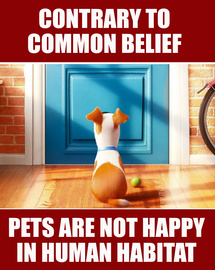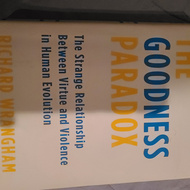ANIMALS ARE NOT HAPPY AS PETS
Just heard a program on NPR where they interviewed an "Animal Ethicist" on whether animals are happy being pets since humans take good care of them, they love them, they save them from harm, save them from diseases, give them best food, give them comforts, let them in their beds, wash them, pedicure them, take them to dog shows, get adoration and make them as members of family?
The pod cast is available here = [wbur.org]
The "animal ethicist" said she has a dog and this will be her last pet. Animals are not happy as being pets. Animals are not created to be pets, or live in captivity. They must live in the nature, eat what they want to eat, run as and where they want to run. We cannot interpret pet ownership as we like to see it - as being good, being generous, being a sacrifice and we giving love. That's not animals want. Neutering or spading is the worst things that humans can do pets.
This will come as a shock to pet owners who love their pets and will vehemently disagree with this notion but this fact is not about questioning your love and you taking care of them. The question is should you really keep doing what animals do not want and you cannot interpret that animals love it because you want it to be that way.
There are several articles published supporting this view.
The case against pets = [aeon.co]
Are Pets As Happy As Their Owners Think They Are? = [thecut.com]
The case against pet ownership = [vox.com]
Should we stop keeping pets? Why more and more ethicists say yes = [theguardian.com]
The Ethics of Keeping Pets: Why Love is Not Enough = [justice-everywhere.org]


Enjoy being online again!
Welcome to the community of good people who base their values on evidence and appreciate civil discourse - the social network you will enjoy.Create your free account
8 comments
Feel free to reply to any comment by clicking the "Reply" button.A lot of people cause a lot of pointless pain and unhappiness to the animals they keep as pets. Not alway though unkindness, but though a total lack of understanding of the animals needs, and a total lack of empathy. If you doubt that, you only have to look at the large numbers of people who are toxic parents to their children, and then ask if you think that dealing with an animal which has different needs, instincts, senses, diet requirements and a much more limited ability to explain its needs to humans, is likely to be any more successful ?
While sadly it is often those most devoted to both their children and their pets who, often, cause the most harm, though a combination of misguided care, and frequently, that bad care being taken to an excessive level.
Yet having said that, there are some animals, such as dogs especially, who have adapted over tens of thousands or years to live in the human world. We and our homes, are, their natural environment, and there is no other to which they are naturally adapted. So the idea that the ethicist is quoted as expressing, that, animals should " live in the nature, eat what they want to eat, run as and where they want to run." Is just another stupid example of exactly that misguided and misunderstanding care.
It is of course at its worst in the case of the so called "exotic" pets, who are rarely happy in a captive environment, and usually least understood by many of the people keeping them. Although some of them are kept by people very well educated in their needs, in the case of exotics it is very much the two extremes. The middle way is in this as in many things nearly always the best way, and pet ownership should sadly be regulated therefore. Breeding even more so. At the minimum licenses should be required, the requirements for which should be more stringent for more exotic animals, and training courses should be offered at the public expense, and in most cases required as a minimum.
It should also be remembered that pets, do have a very positive impact on human health and wellbeing. For many of the old sick and lonely, they can literally add years to their lives.
sounds like a personal psychological crisis. Perhaps there is illness in the animal ethicist or her /his dog?
To me the whole article imparts a sense of pain and defiance. Perhaps the author s pet is dying?
But then I am only guessing, Who knows?
So... dogs and cats running around loose would be better? They'd have much shorter lives due to disease and starvation and predators as well as the very high danger of getting hit by cars.
I'm sure animals are utterly miserable being pampered and cared for and given plenty to eat and having a safe and warm place to sleep every night.
Sure, I could believe this if we were talking about pet alligators or pet mountain lions or pet bengal tigers.
But pretty much 99% of the dogs I've encountered as pets seem to be overjoyed with their lives. But maybe they use all that playing and snuggling and tail wagging to disguise their sadness and anger.
The problem I have with "animal ethics" is that it's not really about all animals. No one screams about cockroaches getting killed or protozoan infections being eradicated. It's only the cute animals that people give a shit about. At it's base it's really just something grown from aesthetics, at least for most people. Please show me the PETA activist chaining himself to the R&D department's door of Raid or Black Flag and maybe they wouldn't seem hypocritical. Puppies are cute. Kittens are cute. Even cows can be cute. Roaches are just horrible and no one gives a shit about them, but they are animals. Animals are, by definition a different species, and you are right, we do project our emotions on them. They live in a different sensory world, smell things we can't, some even see "colors" we can't. It's silly to talk about "happiness" (a human emotion) and then say we don't really understand how animals feel. Of course not. We don't even know if anything akin to "happiness" - a human emotion - is even remotely applicable to their internal states. And another thing, ethics is a human concept. Animals don't have or understand ethics. To say that we, as humans, must treat animals ethically includes the assumption that we are superior (we have ethics and animals don't). No one expects ethical behavior from an animal and when we use ethics as a measurement of worth and say we must treat them ethnically when ethics is beyond their ken, the assumption is that people who treat animals ethically are morally superior to those who don't. That assumption, that ethical treatment is a measure of goodness or desirability, means that animals, without ethics, are fundamentally inferior. And if they are then maybe it's ok to use them as test subjects to save human lives. Humans have ethics and good humans treat animals ethically. But animals don't understand ethics and don't behave ethically.
Animals are food. Other cultures consume the animals we consider pets and we continue animals some cultures consider sacred or inappropriate to eat. It's all based on culture and aesthetics. So don't talk to me about animal ethics until you stand up for the cockroaches, lice, crabs, protozoa, earthworm. Because if you don't then you're not really standing up for all animals, just some. And it's probably the cute ones.
Ohferpetesake. take a look at anyplace that has masses of 'free' dogs roaming the streets, or cats....do any of them look happy or like they are healthy, or even get a good night's sleep?
This was a good post, and raised valid points that all people should take into deeper consideration. Nature (natural instinct) will run free regardless of humans trying to interfere with such. Have long felt that way, and haven't had any pets for years now.
We have bred domesticated dogs over thousands of years to resemble us psychologically. They do seem to enjoy our companionship. This sounds like PETA. I'm not impressed. For that matter, humans have self-domesticated. Should we go back to living in caves and foraging for food?
I agree. There's no source cited for the article. It just contains a bunch of references, none of which are solid in my opinion.
PETA goes way overboard. I'm not sure, but I think a number if those listed study sites lean that way. Dogs and cats have been living with humans for thousands of years, and, as you say, especially in dogs, have become genetically more human friendly so as to keep us happy keeping them.
Certain groups don't think about the what ifs. What if cats have to be let free? Then what? They are small killing machines and birds are easier to get than a full grown rat 
Birds, captured in the wild, are less happy than birds bred in captivity. That is mostly illegal. I have raised birds, and they, human bred ones, bond with people because they think they are now, somehow, a humanish offspring. Most pet birds won't mate. Birds used for mating and the making of eggs are semi feral. I will accept that they might be "happier" in a larger open environment. Still, even though they form a moderation of friendliness to the humans that feed them and clean out their cages.
I've been rambling. All because I agree with you.
I just finished reading a book on human and animal domestication by Harvard biological anthropologist Richard Wrangham. It's a fascinating read about evolution and domestication. I totally agree with you about cats being a problem. I've gone off on several rants here about my neighbors who let their cats roam freely, and come to my yard to feast on songbirds. I love birds, and it's so sad to walk out to my garden and see a pile of feathers lying there. Cats are the #1 cause of bird death. I just read an article about the loneliness of pet parrots, and the experiment some scientists did in which they had parrots call each other on Zoom! If I can find it again, I'll post it. What kind of birds did you raise?
Enjoy being online again!
Welcome to the community of good people who base their values on evidence and appreciate civil discourse - the social network you will enjoy.Create your free account
Share this post
Categories
Agnostic does not evaluate or guarantee the accuracy of any content. Read full disclaimer.







